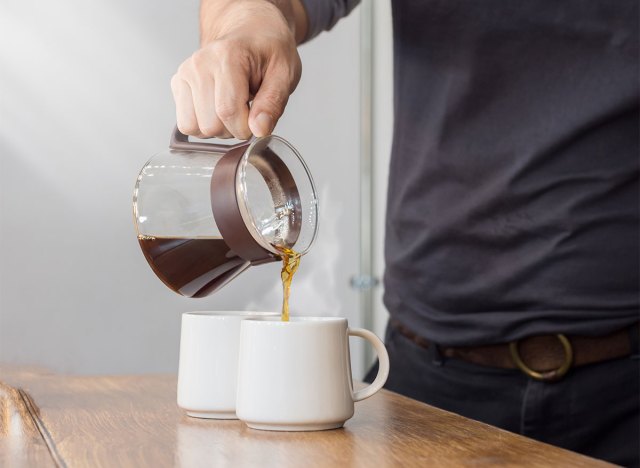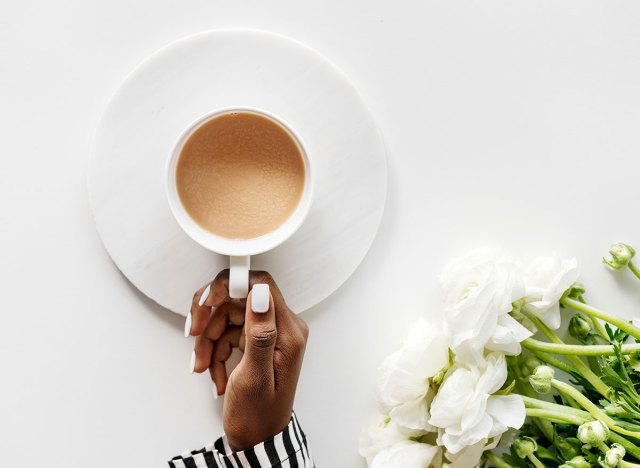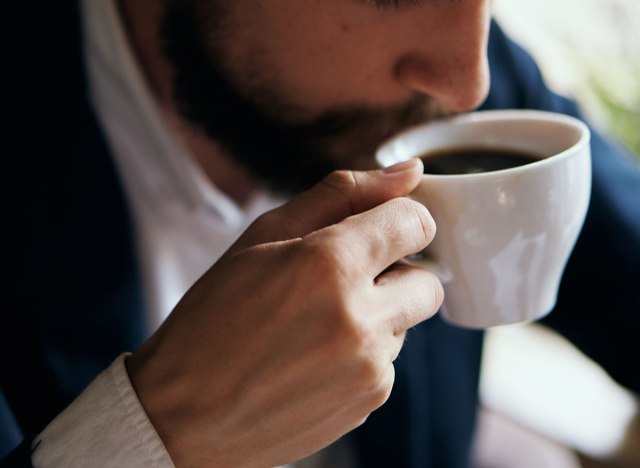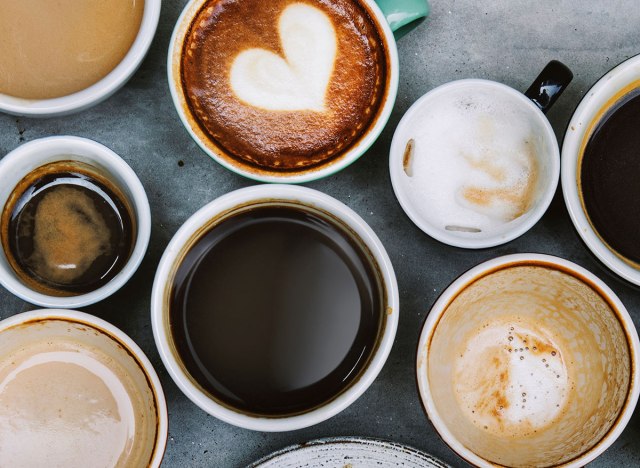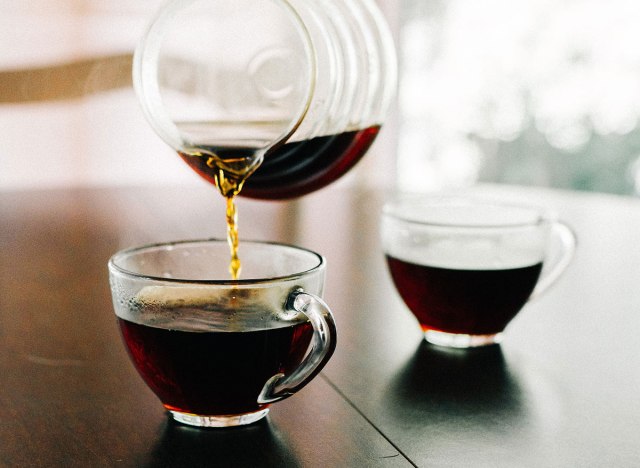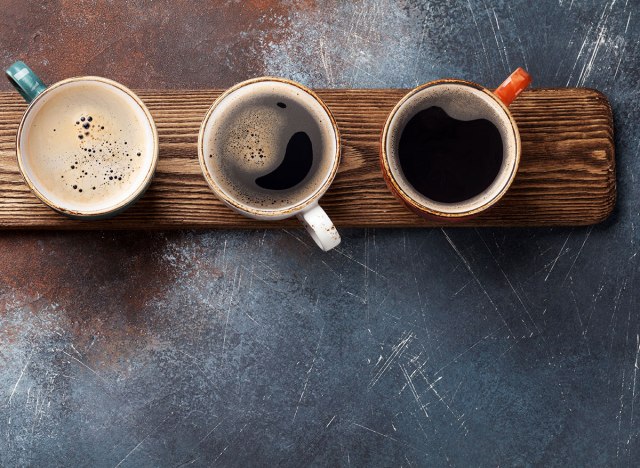Signs You Should Stop Drinking Coffee Avoid Immediately
Raise your hand if pandemic life means more coffee and less sleep. We’ve got both hands up in the air. While there are some solid benefits of drinking coffee—it may reduce your risk of chronic diseases, improve your workout performance, and help you lose weight, to name a few—too much coffee can wreak havoc on your body.
So how much coffee is too much? “Everyone’s caffeine tolerance is different, so I would recommend monitoring your individual symptoms associated with coffee intake,” says Annamaria Louloudis, MS, RDN, founder of Louloudi Nutrition.
If you’re a numbers guy or gal, Kylie Ivanir, MS, RD, who runs her own private practice called Within Nutrition, advises that adults should limit their caffeine intake to about 400 mg per day at the most, which is around three to five 8-ounce cups of brewed coffee.
Ivanir adds that certain groups of individuals, such as those with hypertension (high blood pressure) and pregnant or breastfeeding women, should consider limiting their caffeine intake. (Related: 12 People Who Should Never Drink Coffee, According to Experts.) Coffee can also be a landmine for sugar, “so it is also important to consider what you are putting in your coffee, as sugar, cream, and syrups can impact the health benefits,” she says.
Based on the fact that there may be some dangers to drinking too much coffee, we wanted to ask dietitians: what are the key signs you should stop drinking coffee? Read on for the seven they told us, and for more on how to eat healthy, don’t miss 7 Healthiest Foods to Eat Right Now.
You have high blood pressure.
Sandy Younan Brikho, MDA, RDN, cautions those with high blood pressure (also known as hypertension) to stop drinking coffee ASAP because the caffeine in the coffee causes an increase in your blood pressure. “One study demonstrated an increase in age-related blood pressure among men who consumed a greater amount of coffee,” she offers, though noting that another study found that depending on your genotype, coffee intake may or may not increase one’s blood pressure. “Other research found that high coffee intake among people that metabolize coffee slowly causes an increase in blood pressure,” she continues. Consult with your doctor, but if you suffer from high blood pressure, it’s likely time to kick your coffee habit for good.
You have GERD/acid reflux.
File this under “no thanks,” folks. “Caffeine may trigger acid reflux symptoms because it works to relax the lower esophageal sphincter, causing reflux of stomach acid into the esophagus. Intake of coffee, tea, and soda (all caffeinated beverages) has been associated with an increased risk of gastroesophageal reflux symptoms.” shares Louloudis. “Eliminating caffeinated beverages is a guideline of the American Gastroenterological Association for GERD management,” she adds. For more insight on this condition, check out the 28 Best and Worst Foods for Acid Reflux.
You’re dealing with insomnia or poor sleep.
Sigh, a whole lot of us are these days. Sadly, this means it’s time to take it easy on the java. “Due to its high caffeine content, coffee consumption six hours, or less, before bedtime has been associated with disruptive effects on sleep and increased insomnia,” says Louloudis. If you can’t nix your coffee habit completely, she suggests shifting your drinking habits to earlier in the day and cutting down on your portion size.
Read more: 10 Signs You’re Drinking Too Much Tea
You have an anxiety disorder.
“Due to its high caffeine content, drinking too much coffee can cause increased symptoms of anxiety including heart palpitations, trembling, headaches and insomnia. People who already live with anxiety disorders are particularly sensitive to these negative effects of caffeine,” says Louloudis, citing this study.
You experience withdrawal symptoms when you miss a cup.
These include headaches, decreased energy, decreased alertness, depressed mood, or even flu-like symptoms, says Ivanir. “These symptoms can impact your daily quality of life, making it difficult to concentrate at work or enjoy daily tasks,” she comments. “If you find that your day is dependent on a cup of coffee, it may be a sign that you need to cut back the quantity you are consuming.”
You’re gaining weight.
Here’s how this phenomenon plays out: “Drinking coffee causes a sense of fullness. Often this feeling of fullness leads you to skip a meal or snack,” explains Younan Brikho. “Once this feeling of fullness wears off, your stomach is empty and oftentimes people are starving. This causes many to binge at their next meal because they are so hungry.”
Ladies, you’re missing periods.
On the flip side of weight gain, some people drink coffee in lieu of meals as an unhealthy means to achieve weight loss, and this can impact your menstruation cycle. “A sign you’re drinking too much coffee is menstrual irregularities, in particular not getting a monthly cycle,” says Abby Vichill, MS, RDN, LD, performance dietitian for FWDfuel Sports Nutrition. “Some individuals trying to lose weight or eat in a calorie deficit use coffee as a way to distract themselves from eating, suppress appetite, or create that artificial energy that they are not receiving from consuming a nutritionally adequate diet. A common theme is starting the day with coffee as opposed to food in order to prolong eating,” she continues, elaborating that cortisol is already naturally high in the morning so when you have low blood sugar from not eating breakfast and drinking coffee, cortisol gets pumped out in even higher quantities.
“When the body senses such high levels of cortisol, the brain will signal to the body that it’s in a state of danger and will shut down reproduction in an effort to not put a growing fetus in a stressed environment,” she says. Speaking of cortisol (the stress hormone), check out the Surprising Side Effects Stress Has On Your Waistline, Say Experts.
The post Signs You Should Stop Drinking Coffee Immediately appeared first on .

